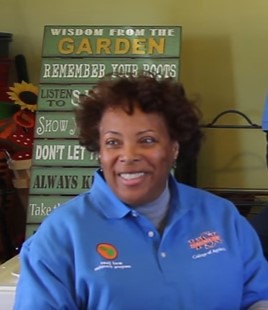
Every month, USDA shares the story of a woman in agriculture who is leading the industry and helping other women succeed along the way. In honor of Veterans Day, we hear from Anita Roberson, a U.S. Army Veteran who started a post service career in agriculture. She and her husband Thomas, also a U.S. Army veteran, both proudly own a ten-acre farm in Spotsylvania County, Virginia, where they produce vegetables, fruit, flowers, and honey.
1. First off, thank you for your service. Tell us about your background and how you got into agriculture.
You are welcome! I grew up in a military family, but some of my fondest memories were of life on the farm with my paternal grandparents. They had an amazing flower and vegetable garden, working dogs, laying chickens, and Jersey cattle. Those magnificent impressions helped me to realize that I was destined to work in the sciences. As an undergraduate, I majored in biology and later joined the Army and served as a Medical Service Corps officer. Later I married a Physician Assistant who grew up on a farm. While serving in Germany, we purchased my aunt’s ten-acre farm so she could retire, thinking it would be an awesome opportunity to help us in our eventual retirement. It was one of the best decisions we made. After we returned to Virginia, we met an Extension Agent who invited us to attend a Small Farm Outreach Program and the rest is history.
2. What does a typical day look like for you?
Our farm specializes in naturally grown vegetables, cut flowers, fruits, and honey. During spring and summer months, I normally am up by 5:30 a.m. to cut flowers and tend to the bee hives while the temperatures are milder. Later I assess which vegetables and fruits require harvesting and start that process. Whenever available, I also attend agricultural training offered by the extension agents, Virginia State University’s Small Farm Outreach program, Virginia Tech, or the local beekeeping association to remain abreast of new agricultural techniques and information.
3. What does agriculture have to offer to military veterans?
Agriculture has a wealth of opportunities to offer military veterans. The USDA has special programs designed to introduce (or reintroduce) veterans to agricultural opportunities and training.
We are members of the Farmer Veteran Coalition, which aims to cultivate a new generation of farmers and food leaders, and develop viable employment and meaningful careers through the collaboration of the farming and military communities. Additionally, agriculture requires skills similar to what is required of military service members. The field is a challenging, evolving, it requires discipline, organization, hard work, and offers fellowship with like-minded souls. Every day on the farm presents a new set of circumstances to defeat, adapt, or overcome. Furthermore, farmers are a very helpful community and are willing to share both successes as well as stories of how to learn from their mistakes.
4. What USDA programs have you and your family utilized for your farm?
We have availed ourselves to the Environmental Quality Incentives Program (EQIP) that allowed us to purchase a high tunnel to extend our growing season. NRCS provided subsidies for cover crops and FSA assisted with crop insurance for the farm. We are also the recipients of a Value-Added Producer’s Planning Grant and presently are working with a contractor on a feasibility study to examine the potential to transform beeswax into value-added products.
5. Who are your role models?
Since both of our grandparents were farmers, my husband I both have great respect for these farmers who were one generation removed from slavery, yet despite the odds, provided loving homes and cared for their families. They were proud people who were remarkably educated, determined to succeed no matter the odds.
6. Any words of advice you’d offer to a veteran looking to start a post-service career in agriculture?
Like in the military: “If you fail to plan, then you plan to fail.” Do your research, seek opportunities and avail yourself to everything that applies. Find a good mentor. We had wonderful mentors and still look to them. Whenever we need advice, they are readily available to assist and help us to succeed.
7. Is there anything else you’d like to share?
If we can do it you can too. There is nothing like growing your own food and flowers!
